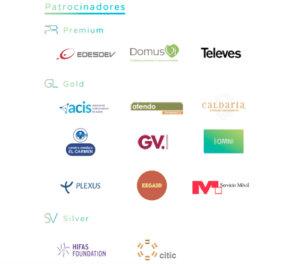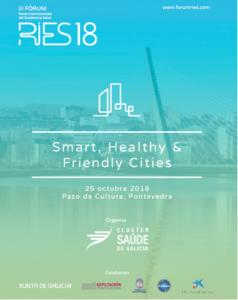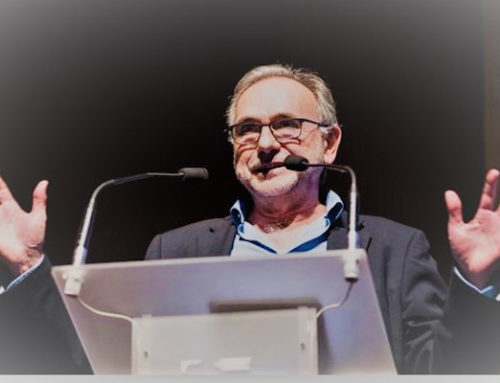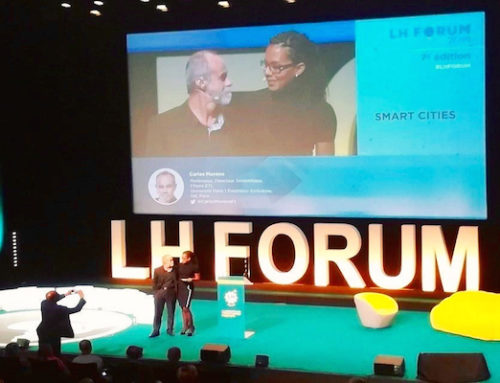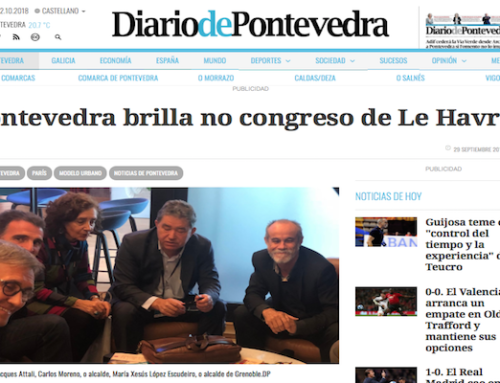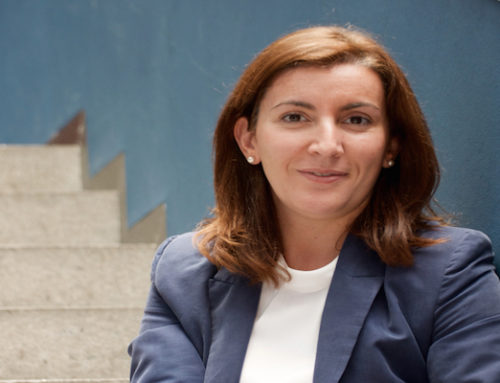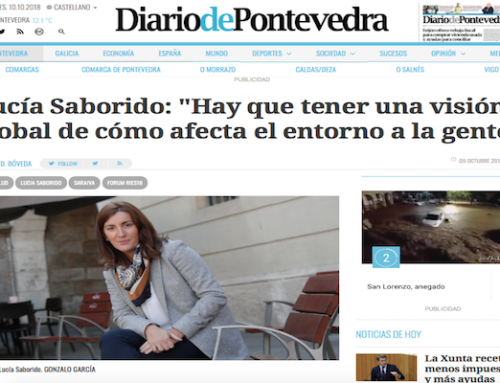III Fórum RIES18 in numbers
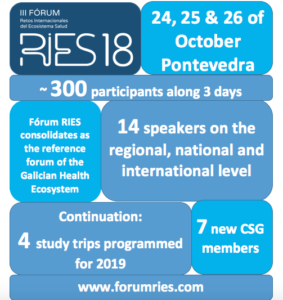
Working on a new concept of a more humane Intelligent City, with the welfare of the citizen as a center, was one of the objectives with which the III Forum RIES18 started. Technology as a tool to improve the lives of people to achieve healthier, more friendly, inclusive, intergenerational, living, humanized, ecological, global and resilient communities.
Organized as the main annual activity of the Cluster Saúde de Galicia (CSG), the third edition of this meeting gathered between 24 and 26 October in Pontevedra more than 300 professionals representing more than 60 entities in the health sector National and international . With three days of contact, debate, collective reflection, meetings, workshops and business visits, the participants were able to lay the foundations and make proposals for new models of cities. These proposals will be consolidated in concrete actions of collaboration and exchange that have already begun.
Forum RIES will continue in a fourth edition that will be held at the end of next year and that will address in depth different aspects of the Silver Economy.

Program III Fórum RIES18
October 24th – Pechakucha: Galicia’s innovative projects
In the pre-session of the III RIES18 Forum, a ‘Pechakucha’ was held, a short and dynamic presentation of four innovative health projects led by Galician companies at the Casa da Luz in Pontevedra.
Representatives of the more than 60 companies associated with the CSG, forum sponsors and local collaborators participated in this meeting.
Envita Project
Noelia López presented the ENVITA project that consists of an online platform to generate our life book. A project that helps us to collect experiences, anecdotes, photographs and stories from our past and present. That it helps us, our relatives and / or our caregivers to better understand our present and the future we want. Currently, ENVITA is in proof of concept within the social care sector and in particular with the elderly but we can already see much more.
Centro Médico el Carmen Project
Marcos Magallanes made a virtual visit to the Carmen Medical Center, showing us all the technological applications that they include in their day to day to humanize the treatment of the patient as well as to streamline processes efficiently. Marcos makes sure that they are updated!
Selmark Care Project
Diego Piñeiro, explained how Selmark Care line came along after listening to the needs of people. This line focuses in providing solutions in the health sector by working on textile design and intelligent textiles. He is currently collaborating with the Living Lab of the University Hospital of Ourense to validate their specific bras for post-operative breast tumors surgeries.
Caldaria Project
Dr. Fernández clarified terms about thermalism and its contributions to wellness. She stressed the importance of the thermal resources in Galicia and the little use that it is made of it up to this day. For this reason, from Caldaria they participate in research and innovation projects with the objectives of validating the thermal cure and promoting this activity as a socio-economic engine.
After the presentation of the different projects, there was a brief introduction and exchange with four of the invited speakers, which facilitated direct and personal contact between all the participants through informal networking. In this way it was possible to have a preview of the content and orientation that the presentations of the following day would have.

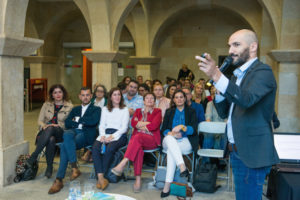
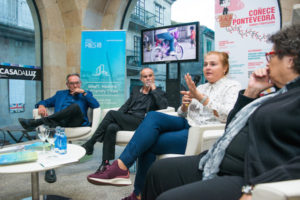
October 25th – Central Day of III Forum RIES18
The main event of the III Forum RIES18 took place in the Pazo da Cultura of Pontevedra, bringing together approximately 250 people, representing 80 entities.
The official opening was done by the president of the III Forum RIES18, Lucía Saborido; the president of the Cluster Saúde de Galicia (CSG), Rocío Mosquera; the conselleiro of Economy, Employement and Industry of the Xunta de Galicia, Francisco Conde López; and the major of Pontevedra, Miguel Anxo Fernández Lores. All agreed that the current concept of a city should not only include technology, but also organized resources, work, cooperation and efforts to put cities at the service of people. A process in which “administrations have to adapt to the change that this implies and provide solutions”. The consolidation of the RIES Forum as a platform for analyzing the state of the art and showcase of the solutions was clear.

The program consisted of three main blocks: two keynote conferences to expose the state of the art of the concepts of existing smart cities, two panels of experts where examples of cities and projects were presented and six democenters where solutions were shown in situ in the last phases of development.
Program:
Keynote Conference. New challenges of the Smart, Healthy & Friendly Cities in the world.
Carlos Moreno – Professor and researcher at Paris I-Pantheon Sorbonne and president of InTI (Innovation, Technology and Investment)
Carlos Moreno evidenced the need to change the current concept of ‘smart cities’ to that of ‘intelligent citizenship’. A transformation that happens, he said, “by eliminating useless and unnecessary mobilities and strengthening the alternatives that technology allows us”. For this, he stressed, it is necessary to “involve all administrations, starting with the municipal ones up to the state ones”.

Moreno, who gave the example of some urban projects from several cities around the world, mainly Paris, also warned that the change towards smart, humanized, inclusive, healthy, resilient citizenship for all ages, goes through unrenounceable needs: ” water, shade and air “, since, he continued,” one of the biggest challenges of today’s urban spaces is that 80 percent of the air is not breathable”.
And he added, “space, time, silence, which have already become real luxuries.” “We urgently need,” he commented, “time for social relations, for interaction between generations, races and ways of life” and, it was very resounding, “silence to avoid noise and poorly managed digital hyperconnection, in which we live permanently and that isolates us personally and socially, as if we were bubbles. ”

Keynote Conference. How Smart Cities technologies are going to be applied to the improvement of health.
Edna Pasher – CEO and Founder of Israel Smart City Institute
Edna Pasher, addressed the aspects of sustainability that new cities and communities must necessarily have from the evaluation of needs, research, strategic planning, implementation of strategies, training and education and awareness in this area.
Taking as an example various actions and projects launched in the city where he usually resides, Tel Aviv added that the new concept of intelligent, healthy and friendly city must contain, among its criteria, the development of social skills to be successful. Well, he stressed, “having technical skills is not enough to position yourself in the world of technology.” Finally, he said, “we need to build quality contacts to be able to access the opportunities, to be able to build all those tools, such as new technologies, software, technology, that really matter and are at the service of people “.
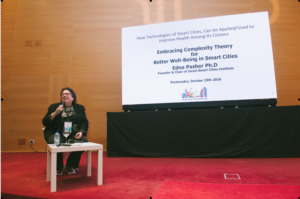
Panel of Experts. Healthier & Smarter Cities: technology, mobility and multiculturalism.
The panel of experts was chaired by the Director of the Digital Health Observatory. European Connected Health Alliance ECHAlliance, Joan Cornet.
The debate revolved around “Healthier cities: technology, mobility and multiculturalism”, and examples of the projects applied in this area of several reference cities where technology works in favor of people were addressed.
The session was attended by the person in charge of the area of Environment and Sustainable Development from the Municipality of Pontevedra, César Mosquera; the executive director of communication of Inova +, of Porto, Gil Gonçalves; Carlos Moreno and Edna Pasher; and the Head of Health Technology Division Connected Health Cluster Manager, from Estonia, Piret Hirv. All of them claimed healthy and friendly environments, for all ages, as an essential and defining element of the new cities of the immediate future. In these cities, not only are public and private infrastructures important for their evolution, but also a change of individual and collective mentality when designing services for their citizenship; the adoption of new personal habits and as a community in social, economic, ecological and even philosophical spheres; the adaptation of information and communication technologies (ICT) to the service of people; the implementation of the fight against climate change or the real integration of all generations in the search and consolidation of collective rights.

Round table. “An ecosystem prepared for collaboration.”
Chaired by the director of Inforesidencias and expert in legal aspects of aging, Josep de Martí exposed how technology can facilitate people’s lives, their health and daily activity, especially in old age and presented the latest innovations and advances in the field social, health, health and personal assistance.
In it, the latest innovations and advances in the social, health, health and personal assistance areas were also presented by experts from the sector.
Several companies and entities of the sector participated in this debate with testimonies and results of the projects that have proven effective in improving the quality of life of the people: In particular Jordi Velasco, director of marketing and communication of Domusvi; Marta Sanz, director of operations of Edesdev; Sara Rodríguez, product manager and Hogar Digital de Televés; and Cristina Vega, business director of Pontevedra Norte of Obra Social la Caixa. All of them contributed
testimonies and results of the projects of these entities that have proven effective in improving the quality of life of people.


Business Factory as an innovation model.
For his part, the director of the Competitiveness Area of the Galician Institute of Economic Promotion (Igape), Norberto Penedo presented the Business Factory innovation model or vertical initiatives focused on the acceleration of projects that can provide numerous advantages for entrepreneurs.

Accelerators of this type are usually led by large corporations or have a network of leading collaborating companies in the sector which allows entrepreneurs not only access to a much more specialized network of mentors and adapted to their needs, as qualified by this expert , “But they have the possibility of sharing experiences and knowledge with entrepreneurs in the same situation and sector, with the consequent generation of synergies” or a powerful network of contacts, potential clients, and even investors with experience and knowledge of the sector They can contribute more than financing.
Democenters
Finally, a broad session of democenters was held in order to create a forum for mass meetings where different business proposals currently underway in the field of education were discussed and worked on in the form of training and practical workshops. health, urban infrastructures, socio-health care or technology.
They created a space for active participation in which different types of business proposals, assistance or health care or health care at the service of people were exposed, also promoting goods and specialized services in this field.
These six dynamic and agile spaces of an hour and a half duration, served to broaden the knowledge on a specifictopic or the activity and product developed by the companies and entities related to the scope of the III RIES18 Forum. The workshops were directed by several entities:
Agency of Knowledge in Health (ACIS) presented its project of “Innovation and humanization in health”. ACIS is a Galician public entity created with the vocation of “becoming the integrating element of the ecosystem of knowledge and innovation in health in Galicia” and a “new vision to face the challenges of knowledge” in which the most valuable tool of professionals health for health care is knowledge.

Atendo, company of integral concept of services to the elderly: Day Center, Home Help and Training that represented the scope of the Silver Economy in the III RIES Forum. In this democenter Atendo presented the functionalities of NETA, an APP designed to improve care for the elderly with mild cognitive impairment.

Plexus, company of Information and Communication Technologies (ICT) specialized in the provision of high added value services that its personal assistance robot presented and the projects with which it is currently working in the same field.

Exga3D one of the new startups booming for its use of 3D printers, although in a very different field from the printing of plastic parts or prosthetics for humans: in this case the gastronomy. Thus, in the III Forum RIES18 launched a practical demonstration and live tasting with a ‘Healthy 3D Cooking Show’ in which he cooked several foods through this technology.
The company GV Soluciones presented its project “Smart Cities, Water Solutions & Health” to improve the quality, channeling and distribution of water, with a demonstration workshop. The company develops and manufactures products, designs individual solutions, advises companies and manages projects for municipalities and industries, always working to improve the quality of water, as demonstrated in the democenter workshop of the III Forum RIES18.
The Active and Healthy Aging and Independent Life project presented by OMNI. An assistance product integrated in the home television, designed for elderly people who live alone, who have some kind of limitation or who do not have contact with new technologies. OMNI allows you to make and receive video calls simply and quickly. In addition, it offers a personalized grill of television channels and incorporates several functionalities that make life easier. In addition, these functions are configurable from the mobile phone through OMNIapp.
Closure


The technical secretary of the Consellería de Sanidade, Alberto Fuentes Losada. presented by the president of the Cluster Saúde de Galicia (CSG), Rocío Mosquera, officially closed the III Forum RIES18 highlighting the “transformative value” of the III Forum RIES18 regarding the concept of Smart Cities which, he said, “gives greater prominence to citizens and the application of technology at the service of people “. Also the great “innovative character” that this meeting has achieved with the presentation and debate of the latest developments and projects that have arisen in recent times in the sector. And, above all, he valued very positively the real and realistic projects that have emerged in this meeting, of which several will be launched in Galicia.
Intercluster meeting
The CSG took the opportunity of this forum to meet with other national health clusters attending from the regions of Aragón (Arahealth), Castilla y León (BIOTECYL and Cluster SIVI) and Galicia (BIOGA and CSG) and consolidate joint projects of effective, useful and beneficial application for its entities and associates. Specifically, the group of clusters decided to consolidate a cross-training project between partners of the different clusters.
In this sense, entities of the different clusters will impart different training programs to the partners and partners of.


October 26th – Company visits
On the third day of the program of the III Forum RIES18, on Friday, October 26th, representatives of the more than 60 companies integrated in the Cluster Saúde de Galicia (CSG) and speakers of the III RIES18 Forum had the opportunity to meet in person SARAIVA SENIOR, Hifas da Terra and Gradiant in a day of visits to different entities that are part of the CSG.
SARAIVA is an entrepreneurial project focused on social innovation in the field of services for the elderly. Located in Pontevedra, it has three multi-service centers for the elderly that include residential accommodation, day center, memory unit, home help and active life unit. Its activity and philosophy are based on person-centered care and the housing model.

Afterwards, the group moved to Hifas da Terra, a biotechnology center specialized in mycology applied to immunotherapy “with more than 20 years of experience in the research and development of adjuvant treatments from extracts of fungi and mushrooms with antitumor, cytotoxic activity, antimetastatic, anti-inflammatory, regenerative etc. demonstrated “, as explained by his deputy general director of Mycological Production and R + D + i, Esteban Sinde.
“With our R & D team composed of biologists, chemists, pharmacists, doctors and oncologists,” he added, “we collaborate with research centers and universities, launching studies in cellular models and clinical trials in patients that expand and consolidate the safe and effective use of mushrooms and mushrooms in integrative treatments “.
Finally and already in Vigo, the team met in person Gradiant, private technology center, structured in a foundation with a mixed patronage that integrates the three Galician universities (A Coruña, Santiago and Vigo); six of the most important ICT companies operating in Galicia (Arteixo Telecom, Egatel, Indra, R, Telefonica and Televes); and the INEO Business Association, which in turn groups a large number of Galician companies in that field.
The mission of Gradiant, as stressed by those responsible, is summarized in “contributing to the innovative dynamism, growth and competitive improvement of the Galician business fabric through technological development and innovation in the use of ICT”.
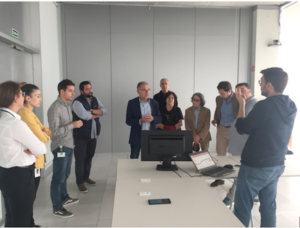
Its philosophy is “to help companies generate business, integrating the transfer of knowledge and designing specialized solutions for the industry, adding the added value of the center’s professionals.” Gradiant, they concluded, “is the key ICT partner for companies they can generate benefits, innovating and designing products “on demand” for each client “.
